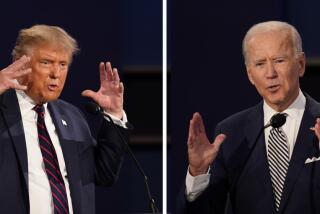A California playbook helps shape Romney-Obama race
The voters were not happy. They didn’t like their choice of candidates: a Democratic incumbent who seemed overmatched by the biggest challenge he faced and a rich Republican businessman with a reluctance to give up his tax returns.
By an overwhelming margin they believed things were seriously off track and, worse, continued to head in the wrong direction.
And yet they delivered embattled California Gov. Gray Davis a second term after a tough and relentlessly negative campaign, which did nothing to lift public spirits but managed to defy several of the perceived laws of political physics.
INTERACTIVE CHART: Presidential campaign contributions, by state
“The day people went to the polls, Davis had a 39% job approval rating, a 57% unfavorable rating and a 75% wrong track rating,” said Garry South, the chief strategist for the Davis campaign. “Any one of those three measurements would traditionally be considered a death knell for an incumbent.”
The reason for Davis’ success was simple: As unpopular as he was, voters cared for his opponent, political neophyte Bill Simon, even less.
Comparing any two campaigns is always imprecise. President Obama is no Davis; people like him far more than the passionless former California governor, and the president’s job approval rating, while mediocre, is also much higher than Davis’ was on election day.
Mitt Romney is no Simon; he served a term as Massachusetts governor, has run twice for president and, for all his missteps, is a far superior candidate to the blundering Simon. (Making his first try for public office, Simon won the GOP nomination with no small help from the Davis camp, which torpedoed former Los Angeles Mayor Richard Riordan with a $10 million ad blitz during the Republican primary.)
That said, the parallels between the 2002 governor’s race and the current presidential contest are unmistakable and meaningful, not least because one of the architects of Davis’ victory, Larry Grisolano, is now a senior strategist for the Obama campaign.
In both instances, there was little chance of changing voters’ minds about the most consequential and defining issue each of the incumbents confronted after taking office.
Obama has failed to delivere a robust economic recovery and, while his defenders say he inherited a mess and needs more time to fix it, probably his best hope is fighting Romney to a draw on that particular front.
Davis stumbled in the early stages of the 2001 electricity crisis and, while he eventually helped bring new power plants on line, his performance was widely judged a failure. Early on, his campaign team tried making a positive case for Davis, but voters weren’t buying it.
“We would show our ads in focus groups and people would say, ‘I don’t believe that for a minute,’” South recalled.
So by necessity the campaign settled on a straightforward, brutal strategy: If they couldn’t make people love Davis - -or even like him very much -- they would work to make his opponent so unappealing that voters would reelect the governor, even if they held their noses doing it.
INTERACTIVE CHART: Outside spending shapes 2012 election
Strategists went straight at Simon’s perceived strength, his business background, which Grisolano called “the core of the brand.” By undermining that image with millions of dollars of ads, the Davis campaign “created a sense of doubt about his Midas touch of steady competence,” Grisolano said from Obama’s campaign headquarters in Chicago.
They received a lot of help, from Simon among others.
The candidate dithered for months, as pressure built, before releasing his tax returns. (Or allowing a peek, rather. Reporters were given two hours, by appointment, to comb through hundreds of pages of documents going back 11 years.)
Simon lost a civil fraud suit and was slapped with a $78-million judgment just a few months before Election Day. (The decision was soon overturned, but not before doing enormous damage to Simon’s campaign.)
And, in a huge embarrassment, he released a photo purporting to show Davis illegally accepting a campaign contribution in his state office as lieutenant governor. Within moments, those with even the most cursory knowledge of Sacramento recognized the photo had been taken elsewhere, and Simon’s credibility was badly undermined.
By that comparison, Romney is a virtuoso campaigner
But the attacks Romney faces -- on his competence, his business and personal ethics, his “relatability” to people as a man of great wealth -- are all familiar, having been field tested a decade ago in California.
Whether they work as well for Obama will be known in a little over seven weeks.
There are three presidential debates to come, tens of millions of dollars in ads still to air and, as events of recent days have shown, the potential for any number of crises -- domestic or international -- to flare and quickly change the shape of the race.
If Obama wins on Nov. 6, the president can be thankful for one thing, however: Voters will have to live with their choice.
Not so in California. A little more than a year after his reelection, Davis was out of office, a victim of a recall effort rooted in the discontent his scorched-earth campaign helped sow.
Twitter: @markzbarabak
More to Read
Get the L.A. Times Politics newsletter
Deeply reported insights into legislation, politics and policy from Sacramento, Washington and beyond. In your inbox three times per week.
You may occasionally receive promotional content from the Los Angeles Times.







